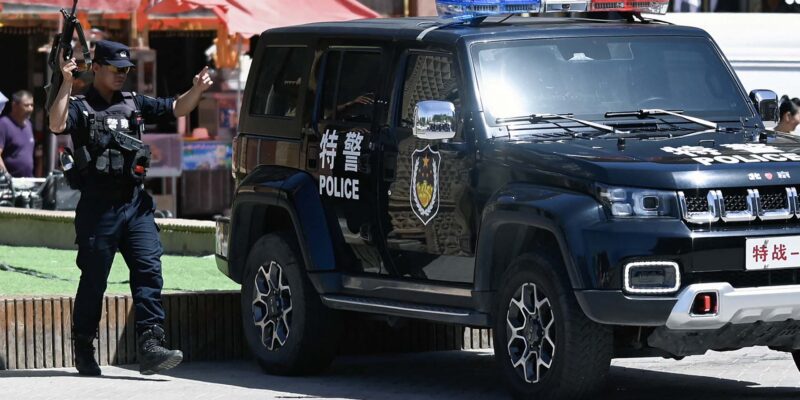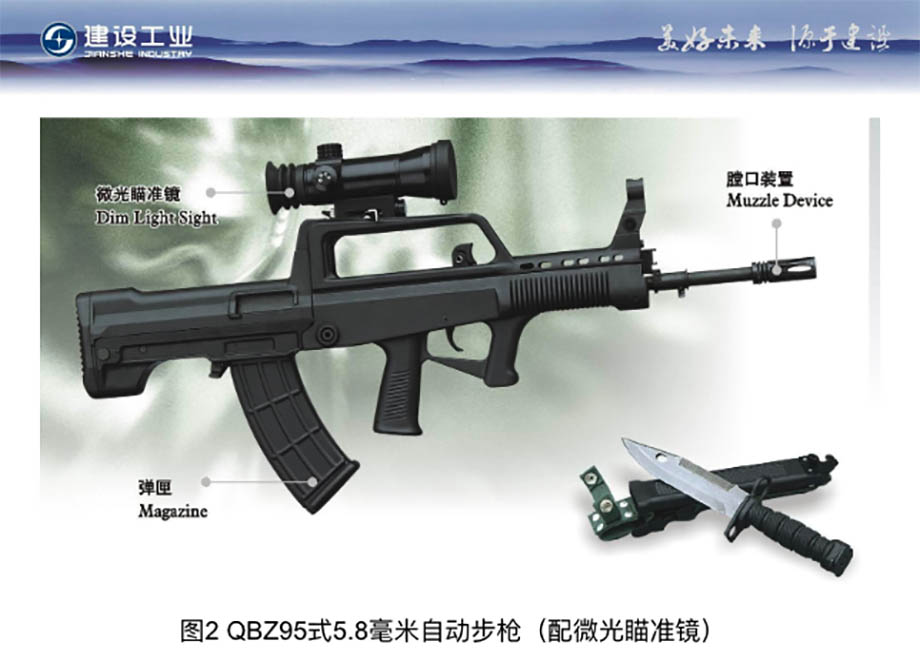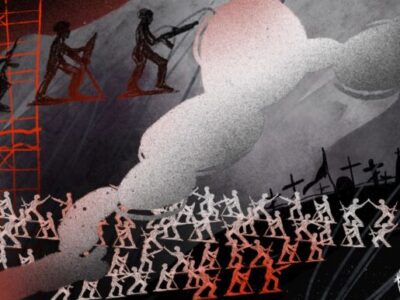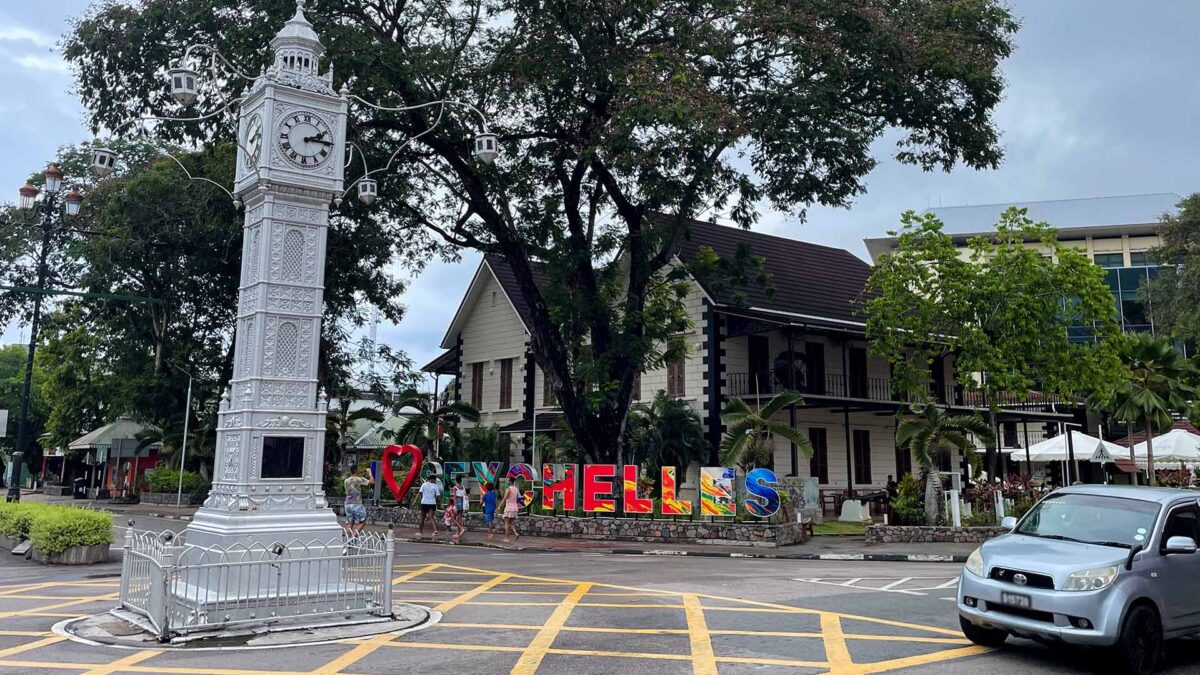
Chinese weapons makers, including one that has provided bayonet-equipped automatic rifles to police in Xinjiang, are selling guns and related products to dealers in the United States, Europe and India despite the manufacturers’ alleged role in Chinese government repression, the International Consortium of Investigative Journalists has found.
The shipments occurred after United Nations officials and rights advocates began exposing China’s mass internment campaign against Muslim minorities in the Northwestern Chinese province, in 2017.
In one case, Chongqing Jianshe Industry has exported hundreds of shotguns to Texas-based Xisico USA Inc. and other American arms dealers. It has also shipped “sporting goods” to Hans Wrage & Co., a hunting equipment company based in Hamburg, Germany, trade records show.
Corporate filings and media reports reviewed by ICIJ show that Jianshe Industry is affiliated with China South Industries Group, one of several Chinese military companies banned from receiving U.S. financing for their alleged role in facilitating “repression or serious human rights abuse.”
In the years after Xi Jinping’s government began intensifying security in Xinjiang, in late 2013, police officers and guards assigned to mass-detention centers in Tekes County were equipped with Type 95 automatic rifles produced by Jianshe Industry, according to confidential training materials and police files shared with ICIJ by researchers at the Victims of Communism Memorial Foundation. Separate security protocols detailed in the files permitted the officers to shoot-to-kill anyone trying to escape from the mass-detention centers — officially called “Vocational Skills Education and Training Centres.” A Uyghur who was detained in a camp in northern Xinjiang later reported having been “escorted out of her camp by police pointing bayoneted automatic rifles at her back,” according to a report by VOC researcher Adrian Zenz.
The Type 95 assault rifle was designed in the mid-1990s by a Chinese engineer dubbed the “king of Chinese rifles” and is considered a staple of the People’s Liberation Army.

Jianshe Industry and Xisico did not respond to ICIJ’s comment requests. A spokesperson for Hans Wrage, the German company, told ICIJ’s media partner NDR that it complies with all laws in line with the “honorable merchant” legal standard and is not aware of Jianshe Industry’s relationship with police forces and other government clients in China.
Another state-owned manufacturer, Qidong Perfect Precise Tools, exports airsoft guns to Mos Manufacture Inc., a California-based firm. The Chinese seller belongs to the same corporate group as a company blacklisted by the U.S. government for its use of forced labor in Xinjiang, corporate records show.(The companies did not respond to ICIJ’s comment requests.)
In 2021, Washington imposed restrictions on some Chinese military companies, preventing them from receiving funds from U.S. investors. But the U.S. government has not banned imports from smaller arms makers that have supplied weapons to Xinjiang police, accused by Uyghur advocates of perpetrating “atrocities” against local ethnic minorities.
In the aftermath of the Chinese government’s 1989 Tiananmen Square crackdown both the U.S. and the European Union announced arms embargo on China. The U.S. embargo prevents the sale of some types of arms to China while EU member countries have leeway in its implementation and some continue to trade weapons with China as well as Hong Kong, according to media reports and arms exports data published by the European External Action Service.
Since the arms embargoes began, China’s domestic arms industry has grown. Xinjiang in particular has become a market for security-related startups, from makers of surveillance cameras and tools for the government’s integrated digital system to riot gear and other police equipment, according to researchers.
With plenty of products developed for military, public security or civil uses in China, manufacturers are increasingly turning to international markets, said Katja Drinhausen, a senior researcher at Mercator Institute for China Studies.
As China boosts its arms sales overseas, experts warn that Western governments’ ambivalent approach towards Chinese arms makers could undermine the effectiveness of other measures aimed at holding Beijing accountable for its human rights abuses in Xinjiang and other provinces.
Current arms trade, supply chain and procurement regulations still fail to effectively address companies whose development and use of products is linked to human rights violations. — Katja Drinhausen, Mercator Institute for China Studies
Current policies mainly regulate the export of weapons to China, rather than imports from the country, because they date back to when the People’s Republic had limited capacity to manufacture and export weapons, Drinhausen said.
Policymakers should learn from the rapid expansion of China’s surveillance camera industry and anticipate growth in arms development and exports, she said. “Current arms trade, supply chain and procurement regulations still fail to effectively address companies whose development and use of products is linked to human rights violations.”
‘Catastrophic suffering’
In 2019, ICIJ’s China Cables investigation, based on classified Chinese government documents, provided an unprecedented view into the coercive nature of the indoctrination centers in Xinjiang and how Chinese officials use a massive mass-surveillance system to isolate the province from the rest of the world.
The findings added to reports by advocates as well as Uyghurs in exile exposing the human toll of government-sanctioned surveillance, torture, sexual violence, family separations and forced labor against ethnic and religious minorities.
Following the investigation, the U.S., the U.K., Canada and the EU leveled sanctions against Chinese officials and companies deemed to have enabled human rights violations in Xinjiang. In 2022, a much-anticipated report by the U.N.’s human rights office accused China of committing serious human rights violations against Muslim minorities in the province that “may” amount to crimes against humanity.
In an interview, Asiye Abdulaheb, a Uyghur who obtained the China Cables confidential documents and shared them with journalists, said the investigation advanced “the world’s understanding of the real status of the Uyghurs” and “changed some people’s understanding of China’s policies towards ethnic minorities.”
Yet Abdulaheb said that, despite the international attention on Xinjiang, living conditions remain unchanged and Uyghurs continue to experience “catastrophic suffering.”
Like her, other Uyghurs whose family members were detained or disappeared have recently expressed frustrations at the ineffectiveness of sanctions against Beijing and the Chinese businesses enabling the repression.
The Chinese government has responded to the accusations saying that its policies in Xinjiang are meant to counter “rampant” terrorist activities.
Its officials have also defended the country’s human rights records at U.N. events.
Last month, speaking at a Geneva conference chaired by Alena Douhan, the U.N. Special Rapporteur on unilateral coercive measures, China’s Assistant Minister of Foreign Affairs Miao Deyu decried unilateral sanctions as “power politics and the law of the jungle.”
The Chinese official also referred to a controversial report authored earlier this year by Douhan, in which the U.N. expert recommended countries to lift unilateral sanctions against China arguing that they contravene international law. Some Uyghur advocates have criticized the rapporteur’s assessment as “misleading,” and have also noted that China has donated hundreds of thousands of dollars to support Douhan’s work for the U.N. (In an interview with Politico Douhan said that she does not personally receive any of those funds.)
Chinese riot-control gear on the web
While Xi’s government continues to dismiss concerns of human rights abuses, some Chinese companies that supply riot control tools and weapons to domestic security forces accused of crimes in Xinjiang try to reach foreign customers.
An ICIJ examination of trade records collected in the ImportGenius database as well as e-commerce platforms reveal that, besides Jianshe Industry, another Xinjiang police supplier sells its products overseas.
In June, Wuwei Police Equipment obtained a $51,000 contract to provide bayonet-equipped batons, riot shields, gas masks and other gear to the Kashgar Public Security Bureau, according to a Chinese procurement record examined by ICIJ.
The company also sells batons and other riot-control tools on websites registered in India and the U.S.
A 2013 report by advocacy group Actions by Christians for the Abolition of Torture listed Wuwei as one of the companies selling thumbcuffs, tools considered controversial because they could be potentially used for torture.
“The utility of such devices for legitimate law enforcement purposes is unclear, whilst their propensity for use in stress positions amounting to torture and other ill-treatment is evident,” the report said.
Wuwei Police Equipment did not respond to ICIJ’s request for comment.















